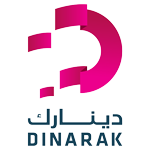ENABLING FINANCIAL INCLUSION THROUGH DINARAK FEMALE AGENT NETWORK
DINARAK PARTNERS WITH GERMAN DEVELOPMENT AGENCY
March 13, 2017Dinarak Jordan: How Mobile Money Can Empower Female Agents and Clients
November 22, 2019ENABLING FINANCIAL INCLUSION THROUGH DINARAK FEMALE AGENT NETWORK
In recent years, the advancement of financial inclusion has attracted the Government of Jordan’s attention, given its multifaceted impact on local economic growth and ability to reduce socio-economic inequalities. Thus, the Central Bank of Jordan developed the ‘National Financial Inclusion Strategy 2018-2020’ to reach and empower the financially excluded and underserved especially in rural areas.
Poor financial inclusion among women is also a key barrier to women’s economic empowerment and broader economic growth, as a lack of access to financial services constrains women from fully participating to markets, and from controlling their earnings.
Working to present women in non-traditional roles can be emancipatory and using technology such as mobile money, would expose women, girls and their communities to alternative representations of women and gender roles. This can progressively change social attitudes towards women and girls, and their own personal aspirations
The business case for gender financial inclusion
Since 2017, the digital financial market in Jordan has experienced significant growth, with four different providers introducing e-wallets to customers. However, social norms have been a big barrier to the inclusive growth of this market, as cultural habits discourage contact between men and women, restricting women’s ability to access new products and constraining their ability to learn if services are solely offered by men.
Gender financial inclusion, however, can be a strong business driver for financial services providers, as households are more likely to select a provider that offers more gender inclusive services, so that both husband and wife can access the product with more ease. In addition, women are also an untapped customer base that is often overlooked and can offer significant returns.
Digital transfers and payments can help to improve access to finance by underserved groups. It can save recipients time, increase use of formal savings, reduce business costs, and thereby improve resilience of households. In particular, it can give women control over the money they earn, also it has a great deal of potential to support women’s wide range of care work and paid activities, as well as to increase their empowerment and agency through better and increased control and access to financial resources.
What is an agent network model?
For many financial service providers, agent networks have proven to be an efficient and cost-effective way to reach unbanked customers residing in low-income areas.
By appointing owners of independent, small-sized businesses as agents, companies have been able to reach new underserved customers through trusted members of the community who perform services in exchange for a small commission, which forms a secondary revenue stream for the agents. In fact, agent network models have been so successful worldwide that their expansion has been imperative to driving financial inclusion in places where financial services remain inaccessible by various minority groups, particularly women.
Dinarak e-wallet allows customers to deposit, withdraw and transfer money, as well as instantly and safely pay bills and utilities any time, any place, using their mobile phones.
The case for a female-agent model
In November 2017, Dinarak – one of Jordan’s pioneer mobile payment services providers – approached AWEF looking for a partner to improve the penetration of their e-wallet among women customers. In early 2018 supported by AWEF, Dinarak launched the first female agent network, which was first implemented in Jerash governorate, with the plan to roll it out more widely across Jordan if successful.
Through the partnership with AWEF, Dinarak recruited thirty women small business owners to operate as agents. Agents were carefully selected based on a few criteria, including their social standing and trust within the community, ability to reach and influence potential women customers, and the strength of their business, allowing them to manage a certain level of cashflow.
Thanks to the female agent model, women were now able to interact directly with women agents, improving their ability to sign-up for the e-wallet, carry out transactions, and access financial information.
Early results of the AWEF-Dinarak partnership
Thanks to this first network of female agents, during the first ten months of operation of the female agent model, Dinarak was able to register 6,000 new female customers, who are now actively using the e-wallet.
A small survey conducted among the users of Dinarak has shown that the women primarily use the e-wallet for paying bills and utilities. Early signs of impact studies conducted by AWEF have shown that thanks to the e-wallet the women are saving significantly on over-the-counter transaction fees, on transport costs, and on time that would have been spent travelling to the bank or to offices where utility bills are generally paid. More than half of the women surveyed have been able to save more than 10JOD per month / 120JOD per year thanks to Dinarak, as shown in the chart below.
